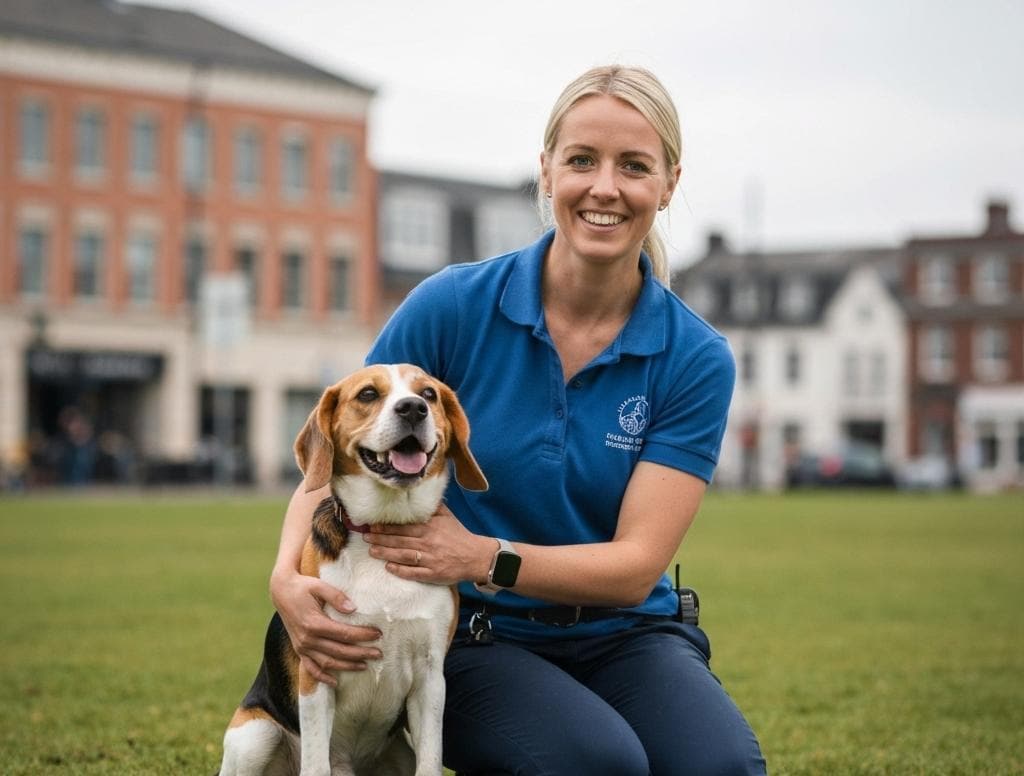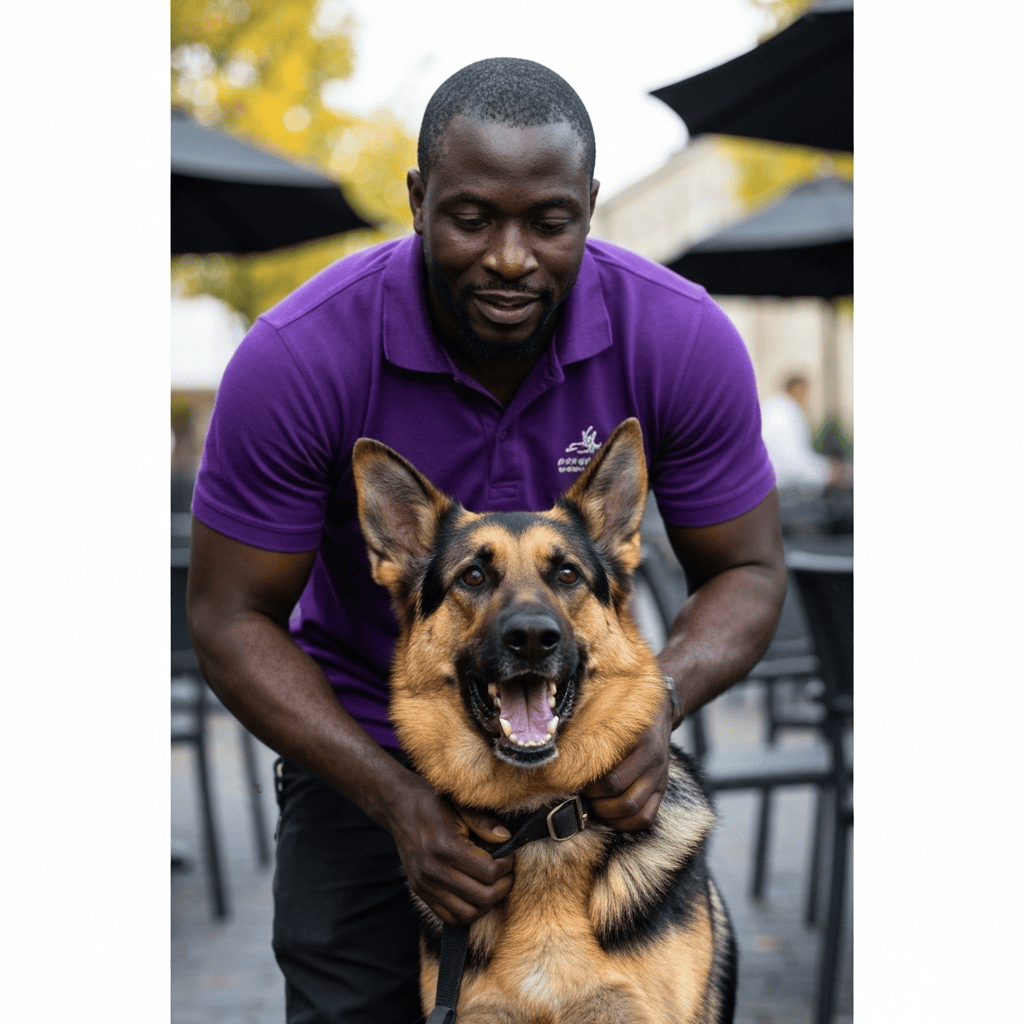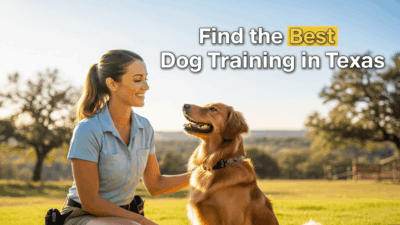Your Complete Guide to Choosing a Dog Trainer in Texas
Living with a dog in Texas means you need training that works in real life – not just in a training facility. Whether you’re navigating busy Austin streets, exploring Dallas dog parks, or enjoying Houston’s outdoor patios, your dog needs skills that translate to everyday Texas living.
The best training programs understand that Texas dogs face unique challenges. They need to handle everything from crowded city sidewalks to wide-open spaces, and they should be comfortable around the friendly strangers who seem to appear everywhere in Texas.
Finding the Right Trainer for Your Dog
When you start looking for a trainer, focus on their methods first. The best trainers use positive reinforcement – they reward the behaviors they want to see instead of punishing mistakes. This approach creates dogs who want to listen to you, not dogs who obey out of fear.
Look for trainers with real credentials from respected organizations. Quality certifications include KPA-CTP, CPDT-KA, IAABC-CDBC, CBCC-KA, or CTC. These aren’t just letters after a name – they represent hundreds of hours of study and hands-on experience.
Your trainer should also listen to what you actually need. Maybe you want your puppy to stop jumping on visitors, or you need your rescue dog to walk calmly past other dogs. The right trainer will create a plan that fits your life, not force you into a one-size-fits-all program.
Most Texas trainers offer different formats – private lessons at your home, group classes, day training where they work with your dog during the day, or board and train programs. Pick what makes sense for your schedule and your dog’s personality.
Understanding Different Training Approaches

Positive reinforcement training works by making good behavior rewarding for your dog. When your dog sits politely instead of jumping, they get treats, praise, or whatever they find most motivating. Over time, they choose the polite behavior because it pays off better than the rude behavior.
For more serious issues like anxiety or reactivity, good trainers use behavior modification techniques. This means they help change how your dog feels about scary or exciting things first, then work on changing what your dog does. It takes longer than quick fixes, but it creates lasting change.
Puppy training focuses heavily on socialization – helping your young dog learn that the world is safe and fun. In Texas, this means getting comfortable with everything from air conditioning units kicking on to the sounds of busy restaurants. Early potty training is also crucial, especially if you’re dealing with Texas heat that makes accident cleanup even less pleasant.
If you’re interested in service dog work or therapy dog certification, make sure your trainer has specific experience in those areas. These are specialized fields that require additional knowledge and often involve working with other professionals.
What You Can Expect to Pay
Training costs vary quite a bit across Texas. Austin and the Dallas-Fort Worth area tend to be pricier, while smaller cities often have more affordable options.
| Service Type | Typical Price in Texas |
|---|---|
| Group classes (4–6 weeks) | $150 – $325 |
| Private lessons (60–90 minutes) | $100 – $200 per session |
| Puppy classes | $150 – $300 per series |
| Day training (trainer works your dog + coaching) | $500 – $1,100 per week |
| Board and train (2–4 weeks) | $2,000 – $4,800 total |
| Behavior consultation | $130 – $250 for initial session |
Before you commit, make sure you understand what’s included in the price. Some trainers offer follow-up support, while others charge extra for additional help. Many offer a free consultation where you can meet them and see if you’re a good fit.
Texas Laws Every Dog Owner Should Know
Texas doesn’t have a statewide leash law, but don’t let that fool you – most cities and counties have their own rules. Dallas, Austin, Houston, and San Antonio all require dogs to be leashed in public except in designated off-leash areas. Check your local ordinances before you practice training in public spaces.
All Texas dogs must be vaccinated for rabies – it’s state law. You can find current requirements at the Texas Department of State Health Services website.
Many Texas cities also have their own licensing requirements. San Antonio uses microchips as official pet identification, which you can read about at San Antonio Animal Care Services. Other cities may require traditional license tags.
If your trainer wants to use public parks for group classes, they should have the proper permits. Responsible trainers coordinate with local parks departments rather than just showing up.
One thing Texas doesn’t regulate is dog trainers themselves. There’s no state licensing requirement, so it’s up to you to check credentials and make sure your trainer carries liability insurance.
Questions That Will Help You Choose
When you talk to potential trainers, here are the questions that will tell you the most:
- What training methods do you use, and why do you prefer them?
- What certifications do you hold from organizations like KPA or CCPDT?
- How will you customize training for my specific dog and situation?
- What format do you recommend – private lessons, group classes, or day training?
- How do you handle dogs with fear, anxiety, or aggression issues?
- What’s included in your packages, and do you offer ongoing support?
- Do you carry liability insurance?
- How will we practice around real-life Texas distractions?
- What will I need to do between sessions to help my dog succeed?
Pay attention not just to their answers, but to how they answer. Good trainers explain things clearly without talking down to you, and they’re honest about what they can and can’t help with.
Helpful Texas Resources for Dog Owners
Texas has some fantastic places to practice training and socialize your dog. Here are some resources to get you started:
- Austin’s off-leash areas at places like Zilker Park: City of Austin Off-Leash Area Map
- NorthBark Dog Park in Dallas with separate areas for different sized dogs: Dallas Park & Recreation
- Johnny Steele Dog Park in Houston’s Buffalo Bayou: Buffalo Bayou Partnership
- Phil Hardberger Park’s dog areas in San Antonio: Phil Hardberger Park Dog Parks

Common Questions About Dog Training in Texas
How much does in-home dog training cost?
Most private trainers in Texas charge between $100 and $200 per session, depending on where you live and the trainer’s experience. Sessions usually last 60 to 90 minutes, and many trainers offer package deals that reduce the per-session cost.
Is in-home dog training worth it?
For most people, yes – especially if you’re dealing with issues that happen at home like jumping on visitors or pulling on walks through your neighborhood. Training where the problems actually occur helps dogs learn faster and makes the skills more reliable.
Can you pay someone to house train your dog?
You can hire a trainer to help with potty training, but remember that success depends mostly on consistency at home. Day training or board and train programs can give you a head start, but you’ll need to stick with the routine they teach you.
What is the 3-3-3 rule for dog training?
This rule helps set realistic expectations for newly adopted dogs. It suggests dogs need about 3 days to decompress from the stress of changing homes, 3 weeks to start learning your routines, and 3 months to fully settle in and show their true personality.
How long will it take to see results?
Most dogs start showing improvement within 2 to 4 weeks if you practice consistently every day. More complex issues like fearfulness or reactivity can take several months to resolve, but you should still see gradual progress along the way.
What should I bring to group classes?
Pack a regular flat collar or well-fitted harness, a standard 6-foot leash, small high-value treats, water for your dog, and vaccination records if your trainer requests them. Leave retractable leashes at home – they make it harder for your dog to learn.
What’s the leash law in Texas?
Texas doesn’t have a statewide leash law, but most individual cities require leashes in public except in designated off-leash areas. Check with your local animal control office to understand the rules where you live and where you plan to train.
Do I need a dog license in Texas?
There’s no statewide licensing requirement, but many cities have their own rules. Some require traditional licenses with tags, while others like San Antonio use microchips as official identification. Check with your city’s animal services department.
What shots does my dog need in Texas?
Rabies vaccination is required by state law for all dogs. Your vet will also likely recommend other core vaccines based on your dog’s age and lifestyle. You can find current rabies requirements at the Texas Department of State Health Services.
Are dog trainers required to be licensed in Texas?
No, Texas doesn’t require trainers to have a state license. This is why checking for professional certifications and insurance coverage is so important when choosing someone to work with your dog.
Where can I practice off-leash recall?
Start in securely fenced dog parks or designated off-leash areas during quieter times of day. Keep a long training leash attached until your dog’s recall is completely reliable, even around major distractions.
Which dog parks allow training in Texas?
Most Texas dog parks welcome polite training practice like working on “come,” “leave it,” or calm greetings. Popular options include NorthBark in Dallas, Johnny Steele in Houston, and the dog parks at Phil Hardberger in San Antonio. Always follow posted rules and be considerate of other park users.
What beaches and trails allow dogs for training?
Texas State Parks welcome leashed dogs on most trails – check the specific rules at their pet information page. Along the coast, Padre Island National Seashore allows leashed dogs in many areas, though you should check current National Park Service guidelines before your visit.
The right trainer will help you and your dog navigate Texas life with confidence. Look for someone who uses humane methods, has solid credentials, and creates a training plan that fits your real-world needs. With good guidance and consistent practice, your dog can become the well-behaved companion you both want to be.
